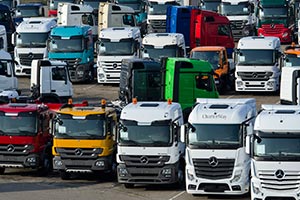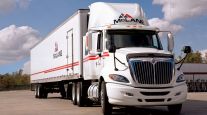European Truck Fuel Efficiency Stalls as US Continues to Tighten Emissions Standards

Trucks in the European Union are no more fuel-efficient than they were more than a decade ago, according to a report released Dec. 3, as calls increase for emissions from heavy-duty vehicles to be regulated in the same way as cars.
The study by the International Council on Clean Transportation found that the fuel efficiency of heavy-duty vehicles, which are responsible for one-third of CO2 emissions in the EU but only a small fraction of vehicles on the road, had remained unchanged since the early 2000s.
In contrast, the United States in June proposed tighter standards on truck emissions which the researchers estimated could lead to a 33% reduction of fuel consumption rates from 2010 levels.
"Truck makers claim we can trust them to deliver more efficient trucks," said William Todts, freight manager at campaign group Transport & Environment.
"The reality is, that for the last decade, they've made virtually no progress in fuel efficiency while for much of that time they are alleged to have operated a cartel. It's high time we shift gears and introduce U.S.-style fuel economy standards," he said.
The report comes as EU antitrust regulators are investigating some of Europe's biggest truck makers for price fixing and coordinating the introduction of new emissions technologies, according to a copy of the statement of objections seen by Reuters.
The truck manufacturers accused of operating a cartel, Daimler, Volvo, Iveco, Volkswagen-controlled Scania, MAN and DAF, could face fines of up to 10% of their annual revenue if found guilty.
The study by ICCT, the same group that uncovered German carmaker Volkswagen's manipulation of diesel nitrogen oxide emission tests, found that the share of CO2 emissions from trucks was growing in the EU.
The industry group European Automobile Manufacturers' Association said fuel consumption per ton-kilometer of today's trucks had been reduced by at least 60% since 1965.
"Per ton transported, this has resulted in fuel consumption of as little as nearly 1 liter of diesel per 100 ton-km, delivering a significant reduction of CO2 emissions," said Erik Jonnaert, secretary general of ACEA, whose members include Daimler, Renault and Volkswagen.
Jonnaert pointed to a study by the research institute Transport and Mobility Leuven that showed the industry was on track to meet its commitment to reduce fuel consumption from new vehicles by 20% by 2020, compared with 2005.
The ICCT study analyzed sales trends in the EU showing that more heavy and large vehicles were being sold in the 28-country bloc, similar to those on the U.S. market.
The study recommends setting fuel efficiency standards or CO2 limits for heavy-duty vehicles to bring down emissions. The EU has introduced a limit of 95 grams of CO2 per kilometer by 2021 for cars and vans but so far has not done the same for trucks, although several countries have called for it.




